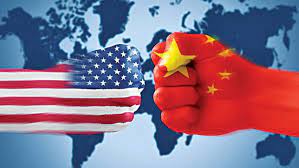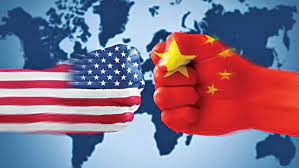
On Thursday, President Joe Biden signed a bill aimed at combating human rights violations in China's Xinjiang region.
The law prohibits imports from Xinjiang and punishes those who are involved in forced labour in the province. The proposal is Washington's latest attempt to alleviate China's severe treatment of the Uyghur Muslim minority.
Following an overwhelming bipartisan majority in the House, the Senate passed the bill unanimously this month, demonstrating widespread support for addressing human rights abuses in the region.
The Chinese Embassy in Washington did not respond to a request for comment from CNBC right away. Beijing has disputed that religious and ethnic minorities in the region have been treated unfairly.
The maltreatment of Uyghurs and other Muslim minorities in the region has previously been condemned by the Biden administration as "widespread, state-sponsored forced labour" and "mass confinement."
Businesses that have Xinjiang supply chain and investment linkages have been cautioned by the Biden administration that they could face legal consequences. Growing evidence of genocide and other human rights violations in the country's northwest area was presented.
The Departments of State, Treasury, Commerce, Homeland Security, and Labor, as well as the Office of the United States Trade Representative, issued a warning to enterprises related to the Chinese government in Xinjiang even "indirectly" in July.
The most-pointed line from the Xinjiang Supply Chain Business Advisory states that “businesses and individuals that do not exit supply chains, ventures, and/or investments connected to Xinjiang could run a high risk of violating U.S. law.”
Intel sent a letter to its vendors earlier this month stating that it was needed to "ensure that its supply chain does not use any labour or obtain goods or services from the Xinjiang area."
The letter sparked outrage in China, where Intel has around 10,000 employees.
Intel apologised in a fresh statement published in Chinese on Thursday, claiming that the choice to avoid Xinjiang supplies was made to comply with US legislation, not to express its human rights perspective.
“We apologize for the trouble caused to our respected Chinese customers, partners and the public. Intel is committed to becoming a trusted technology partner and accelerating joint development with China,” the company wrote.
"American firms should never feel the need to apologise for standing up for fundamental human rights or opposing persecution," White House press secretary Jen Psaki said, without explicitly commenting on Intel's apology.
“We call on all industries to ensure that they are not sourcing products that involve forced labor, including forced labor from Xinjiang,” she added.
30 Chinese research institutes were subjected to trade restrictions by the Commerce Department last week. Eight Chinese IT companies have been sanctioned by the US Treasury Department for human rights abuses.
U.S. charges were denied as "completely groundless" by the Chinese Embassy in Washington, D.C.
“The United States has been making excuses to suppress and contain certain foreign companies and research institutions by applying measures such as export control,” embassy spokesperson Liu Pengyu said in a statement provided to the media.
(Source:www.aljazeera.com)
The law prohibits imports from Xinjiang and punishes those who are involved in forced labour in the province. The proposal is Washington's latest attempt to alleviate China's severe treatment of the Uyghur Muslim minority.
Following an overwhelming bipartisan majority in the House, the Senate passed the bill unanimously this month, demonstrating widespread support for addressing human rights abuses in the region.
The Chinese Embassy in Washington did not respond to a request for comment from CNBC right away. Beijing has disputed that religious and ethnic minorities in the region have been treated unfairly.
The maltreatment of Uyghurs and other Muslim minorities in the region has previously been condemned by the Biden administration as "widespread, state-sponsored forced labour" and "mass confinement."
Businesses that have Xinjiang supply chain and investment linkages have been cautioned by the Biden administration that they could face legal consequences. Growing evidence of genocide and other human rights violations in the country's northwest area was presented.
The Departments of State, Treasury, Commerce, Homeland Security, and Labor, as well as the Office of the United States Trade Representative, issued a warning to enterprises related to the Chinese government in Xinjiang even "indirectly" in July.
The most-pointed line from the Xinjiang Supply Chain Business Advisory states that “businesses and individuals that do not exit supply chains, ventures, and/or investments connected to Xinjiang could run a high risk of violating U.S. law.”
Intel sent a letter to its vendors earlier this month stating that it was needed to "ensure that its supply chain does not use any labour or obtain goods or services from the Xinjiang area."
The letter sparked outrage in China, where Intel has around 10,000 employees.
Intel apologised in a fresh statement published in Chinese on Thursday, claiming that the choice to avoid Xinjiang supplies was made to comply with US legislation, not to express its human rights perspective.
“We apologize for the trouble caused to our respected Chinese customers, partners and the public. Intel is committed to becoming a trusted technology partner and accelerating joint development with China,” the company wrote.
"American firms should never feel the need to apologise for standing up for fundamental human rights or opposing persecution," White House press secretary Jen Psaki said, without explicitly commenting on Intel's apology.
“We call on all industries to ensure that they are not sourcing products that involve forced labor, including forced labor from Xinjiang,” she added.
30 Chinese research institutes were subjected to trade restrictions by the Commerce Department last week. Eight Chinese IT companies have been sanctioned by the US Treasury Department for human rights abuses.
U.S. charges were denied as "completely groundless" by the Chinese Embassy in Washington, D.C.
“The United States has been making excuses to suppress and contain certain foreign companies and research institutions by applying measures such as export control,” embassy spokesperson Liu Pengyu said in a statement provided to the media.
(Source:www.aljazeera.com)





